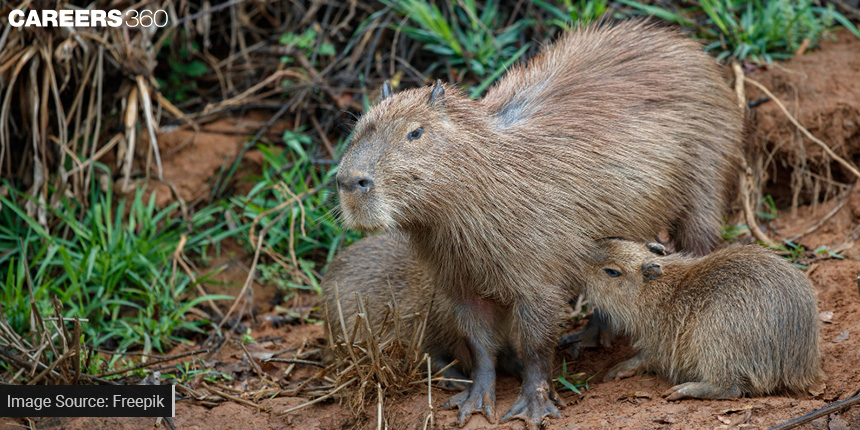Maternal Behaviour: How Do Animals Nurture Their Young Ones?
Maternal behaviour of animals: Mothers are on a continuous duty to provide their children with the best and protect them to ensure their healthy survival. Humans celebrate Mother’s Day on a particular date, but all mothers are worth celebrating every day due to their dedication and immense love. It’s not only humans but animals too who need their mothers to preserve them and form a family.

Some animals may need mothers for longer periods, while others may need mothers for only a few weeks. The maternal instincts of different animals vary from each other, and they are biologically programmed differently.
Maternal behaviour differs on the basis of species; for example, mammals are known to show the most nurturing behaviour, but other species, like reptiles, may show little or no maternal behaviour.
Also Read | How Does Early Onset Of Puberty Affect Individuals Over Time?
Why Are Mothers Important?
Mothers are explicitly known for their nurturing and caring behaviour. We call nature ‘Mother Nature’ because it provides an environment to live in and also food. Similarly, animal mothers are extremely nurturing towards their babies, especially mammals.
Mothers are important because all mothers provide their babies with nourishment, comfort, and security for variable periods of time to ensure their survival. The animal mothers are biologically programmed in such a way that their babies inherit cultural wisdom and a sense of survival in the wilderness.
Large biodiversity is seen in nature, due to which mothers become the leading or mentoring figures to pass on their knowledge and maintain the culture and biodiversity. Other than food habits, babies also learn about their communities, social habits, hunting practices, survival, and more that are crucial for the successful survival of the lineage or group.
Let’s look at some examples to study the mothering behaviour of animals.
Pigs
Do you know elephants and pigs are great mothers? A pig mom can identify her piglets’ calls specifically, even though we might find the sounds of all piglets similar. However, pig moms can differentiate between their own and other piglets and react strongly to their piglets’ calls. The attachment of piglets to their mothers is so strong that the babies will scream in sorrow if they are separated from their mothers.
Another interesting fact about pig moms (sows) is that they sing to their young ones. The sows live in groups of five to six and support each other in nursing their young.
Elephants
These big land animals make the best mothers on the planet. The special fact about these elephant moms is that they carry their calves for 22 months! Apart from the long gestation period, elephant moms also carry one of the heaviest babies in their wombs. The mothers are found in a matriarchal society where the other mothers help each other nurse the newly born. In case the mother elephant dies, other mothers of the group adopt the baby elephants and take care of them.
Also Read | How To Recognise And Tackle Food Addiction?
Monkeys/ Orangutan
The bond between monkeys and their children is very strong, as the mother piggybacks on the baby for a long time. She also breastfeeds the young ones, and thus the baby relies completely on the mother for food and survival. These skills are eventually passed on, and thus every mother takes care of their babies as a long-term commitment.
Penguins
The penguin also makes an excellent mother, as she keeps the babies in her pouch for some time to keep them warm. After she lays the egg, the father protects the fragile egg as the mother travels up to 50 km to the ocean to fetch fish for the baby penguin.
Are All Animal Mothers The Same?

Definitely not! The nurturing behaviour of mothers differs based on species. Though we have read that most mammals, birds, and reptiles have strong maternal instincts, there are also mothers who are not as nurturing as others. This might be due to the cultural or community practices that have existed in nature for a long time now. Some mothers of the animal kingdom show sheer laziness or lack of emotion towards their babies, and some may even leave them in a week’s time.
Having read about the incredible animal mothers, we shall also have a look at some bad animal mothers.
Animals like bears and pandas can be seen with their babies and appear to be great moms; however, they exhibit some bad traits. Among all its cubs, the mother raises only the weakest or her favourite and abandons the others.
Although house sparrows are adorable, they can be terrible mothers, especially to other people's young. If her partner mates with another sparrow, the mother sparrow will find out about the difference and kill the resulting chicks.
Black eagles can be strong and strict, here the mom does not stop the quarrels of her babies, even if the fight grows cruel and the stronger sibling kills the weaker one.
Also Read | Understanding the Science Behind Third Gender Identities
Applications for Admissions are open.
As per latest syllabus. Physics formulas, equations, & laws of class 11 & 12th chapters
JEE Main Important Chemistry formulas
Get nowAs per latest syllabus. Chemistry formulas, equations, & laws of class 11 & 12th chapters
JEE Main high scoring chapters and topics
Get nowAs per latest 2024 syllabus. Study 40% syllabus and score upto 100% marks in JEE
JEE Main Important Mathematics Formulas
Get nowAs per latest syllabus. Maths formulas, equations, & theorems of class 11 & 12th chapters
